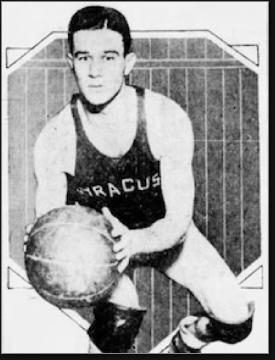
Sports: Football & Basketball
Born: September 30, 1908
Died: June 28, 1984
Town: Paterson, New Jersey
Louis Edward Hayman was born September 30, 1908 in New York City and grew up in Paterson, NJ. A gifted athlete who played baseball, football and basketball, “Lew” (as his name would later appear in print) was sent to prep school at the New York Military Academy and enrolled at Syracuse University in 1927. He played varsity baseball and football, but his best sport in college was basketball. He was part of the school’s famous “Reindeer Five” and scored in double-figures in all three varsity seasons. As senior captain in 1931, “Syracuse Lew” was named a third-team All-American.
As many top college athletes did during the Depression, Lew eschewed pro sports and went right into coaching. He landed a job as an assistant football coach at the University of Toronto and was hired the following year by the Toronto Argonauts, also as an assistant. In 1933, Lew became the club’s head coach and, at the age of 25, led the Argos to the Grey Cup title. Toronto won it all again in 1937 and 1938.
During World War II, Lew joined the Royal Canadian Air Force and led the Toronto’s RCAF Hurricanes to the Grey Cup championship in 1942 over the Winnipeg RCAF Blue Bombers.
After the war, Lew was one of the founders—and inaugural head coach—of the Montreal Alouettes, who played their first season in 1946. A local baseball player by the name of Jackie Robinson had a great year for the Montreal Royals and drew big crowds. The Alouettes promptly broke Canadian football’s racial barrier and signed Herb Trawick, a superb two-way player who enjoyed a 12-year pro career. Lew led the “Larks” to the Grey Cup in 1949 and, in 1952, retired to the front office. He was later an executive with the Argonauts.
In 1969, Lew was named president of the CFL. In 1975, he was enshrined in the Canadian Football Hall of Fame. He worked for Toronto until 1981 and passed away in 1984. The MVP trophy for the CFL’s Eastern Division is named in his honor.